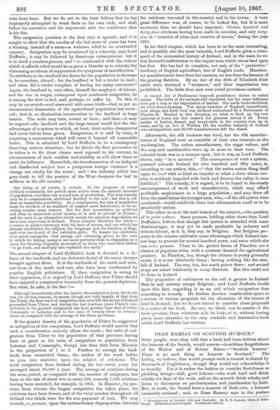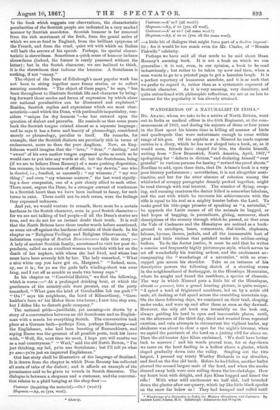DEAN RAMSAY ON SCOTTISH HUMOUR.* SOME people, were they told
that a book had been written about the humour of the Scotch, would answer—in sublime forgetfulness of Sir Walter and of Robert Burns—" Scottish humour ! There is no such thing as humour in Scotland." The feeling, we believe, that would prompt such a remark is shared by thousands of Englishmen, though they would not acknowledge it so broadly. For it is rather the fashion to consider Scotchmen as plodding beings—dull, good fellows—who work hard and drink whisky six days of the week, and on the seventh drink whisky and listen to discourses on predestination and justification by faith. But, in truth, the Scotch have a humour of their own, a humour eminently national ; and, as Dean Ramsay says in the preface
Reminiscences of Scottish Life and Character. By E. B. Ramsay, Dean of Edin- burgh. Edmousteu end Boughs. Fourteenth edition. to the book which suggests our observations, the characteristic peculiarities of the Scottish people are indicated in a very market manner by Scottish anecdotes. Scottish humour is far removed from the rich merriment of the Irish, from the genial satire of which we are so fond in England, from the brilliant epigrams of the French, and from the cruel, quiet wit with which an Italian will barb the arrows of -his speech. Perhaps; its special charac- teristic is shrewdness. Sometimes a quick sense of humour induces shrewdness (indeed, the former is rarely possessed without the latter); but in the Scotch character, we are inclined to think, it is the shrewdness that induces the humour. A Scotchman is nothing, if not "canny."
The object of the Dean of Edinburgh's most popular work has not been to string together mere funny stories, or to collect amusing anecdotes. " The object of these pages," he says, "has been throughout to illustrate Scottish life and character by bring- ing forward those modes and forms of expression by which alone our national peculiarities can be illustrated and explained." Besides, Scottish replies and expressions which are most char- acteristic—and which the Dean, with pardonable impartiality, con- siders " unique for dry humour "—he has entered upon the question of dialect and proverbs. He reminds us that some years back the Scottish tongue existed almost as a separate language ; and he says it has a force and beauty of phraseology, considered
merely as phraseology, peculiar to itself. He remarks, for example, that the Scottish dialects are peculiarly rich in terms of endearment, more so than the pure Anglican. Now, an Eng- lishman would imagine that the " love," " dear," " darling," and " sweet" of his own mother tongue expressed quite as much -as he would care to put into any words at all; but the Scotchman, being (if we are to believe Dean Ramsay) of a more gushing disposition, has recourse, in his moments of effusion, to "my dawtie," one who is dawted, i.e., fondled, or. caressed) ; " my winsome ;" " my wee thing ;" and even " my winsome marrow," the last word signify- ing a dear companion, one of a pair closely allied to each other. There must, argues the Dean, be a stronger current of tenderness in a Scottish heart than we have been inclined to fancy, for such terms to exist. There could not be such terms, were the feelings they expressed unknown.
And yet, we would venture to remark, there must be a certain hardness in the Scotch character, even in good Scotch character— for we are not talking of bad people—if all the Dean's stories are true, and we do not for an instant doubt their truth. It is well that the North Britons have those tender words before mentioned, as some set-off against the hardness of certain of their deeds. In his chapter on " Religious Feelings and Religious Observances," the industrious compiler of Scottish Reminiscences tells this story :- A lady of ancient Scottish family, accustomed to visit her poor de- pendents, called on an excellent woman to condole with her on the death of her nephew, with whom she had lived, and whose loss must have been severely felt by her. The lady remarked, " What a nice white cap you have got on, Margaret." " Indeed, mem, ay, sae it is ; for ye see the gude lad's winding-sheet was ower lang, and I cut aff as muckle as made twa bonny caps."
In his chapter on " Convivial Habits," we find the following, which is worse :—" At a prolonged drinking bout, at which the gentlemen of the country-side were present, one of the party remarked, " What gars the laird of Garskadden luk sae gash ?"* " Oa!" says his neighbour, the laird of Kilmardinny, " Gars- kadden's been wi' his Maker these twa hours ; Isaw him step awe, but I didna like to disturb gude company."
The national pride—justifiable, yet amusing—is shown by a story of a conversation between an old Scotchman and an English- man with a mania for everything Scotch. The conversation took place at a German bath—perhaps Ems, perhaps Hombourg—and the Englishman, who had been boasting of Bannockburn, and saying Burns was the greatest of all possible poets, took his leave with, " Well, Sir, next time we meet, I hope you will receive me as a real countryman." " Weel," said the old North Briton, " Pm jest thinking, my lad, ye're nae Scotchman ; but I'll tell ye what ye are—ye're jest an improved Englishman."
Our last story shall be illustrative of the language .of Scotland. It is drawn from the chapter in which Dean Ramsay has collected all sorts of tales of the dialect ; and it affords an example of the prominence said to be given to vowels in Scotch discourse. The dialogue is between a shopman and a customer, and the conversa- tion relates to a plaid hanging at the shop door :—
Customer (inquiring the material).-0o (wool?) Shopman.—Ay, oo (yes, wool).
• Ghastly,
Customer.—A.' 00? (all wool?) Shopman.—Ay, a' oo (yes, all wool).
Customer.—A' ae oo? (all same wool?)
Shopman.—Ay, a' as oo (yes, all the same wool).
—a little bit of dialogue that might form part of a theatre impossi- ble ; for it would be too much even for Mr. Clarke, of " Bonnie Fishwife" celebrity.
Perhaps we have said all that needs to be said about Dean Ramsay's amusing book. It is not a book on which we can generalize : it is not, even, in our opinion, a book to be read industriously ; but rather to be taken up now and then, when a man wants to go to a printed page to get a harmless laugh. It is a perfect repertory of humorous anecdote, and it is as such that we prefer to regard it, rather than as a systematic exponent of Scottish character. As it is very amusing, very desultory, and quite unburdened with philosophic reflections, we are at no loss to account for the popularity it has already attained.































 Previous page
Previous page